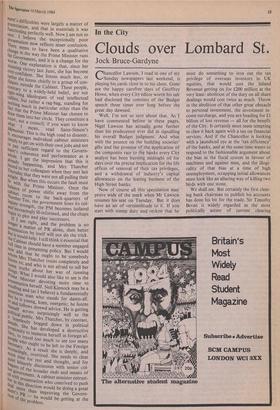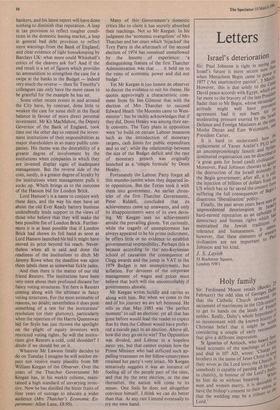In the City
Clouds over Lombard St.
Jock Bruce-Gardyne
Chancellor Lawson, I read in one of my Sunday newspapers last weekend, is playing his cards close in to his chest. Gone are the happy carefree days of Geoffrey Howe, when every City editor worth his salt had disclosed the contents of the Budget speech three times over long before the great day dawned.
Well, I'm not so sure about that. As I have commented before in these pages, Nigel Lawson has actually gone further than his predecessor ever did in signalling his overall Budget judgment. And what with the pounce on the building societies' gilts and the promise of the application of the composite rate to the banks every City analyst has been burning midnight oil for days over the precise implication for the life offices of removal of their tax privileges, and a withdrawal of industry's capital allowances on the leasing business of the High Street banks.
Now of course all this speculation may prove wide of the mark when Mr Lawson resumes his seat on Tuesday. But it does have an air of verisimilitude to it. If you start with stamp duty and reckon that he
must do something to iron out the tax privilege of overseas investors in UK equities, that would cost the Inland Revenue getting on for £200 million at the very least: abolition of the duty on all share dealings would cost twice as much. Throw in the abolition of that other great obstacle to personal investment, the investment in- come surcharge, and you are heading for £1 billion of lost revenue — all for the benefit of the City. It certainly must seem tempting to claw it back again with a tax on financial services. And if the Chancellor is looking with a jaundiced eye at the "tax efficiency' of the banks, and at the some time wants to respond to the fashionable argument about the bias in the fiscal system in favour of machines and against men, and the illogi- cality of that bias at a time of high unemployment, scrapping initial allowances must look like an alluring way of killing two birds with one stone, We shall see. But certainly the first clear- ing bank chairman to publish his accounts has done his bit for the trade. Sir Timothy Bevan is widely regarded as the most politically astute of current clearing bankers, and his latest report will have done nothing to diminish that reputation. A leap in tax provision to reflect tougher condi- tions in the domestic leasing market,.a leap in general bad debt provision to reflect stern warnings from the Bank of England, and clear evidence of tight housekeeping by Barclays UK: what more could Whitehall's critics of the clearers ask for? And if the end result is a set of figures which provides no ammunition to strengthen the case for a swipe at the banks in the Budget — indeed very much the reverse — then Sir Timothy's colleagues can only have the more cause to be grateful for the example he has set.
Some other recent events in and around the City have, by contrast, done little to weaken the case for some shift in the fiscal balance in favour of more direct personal investment. Mr Kit MacMahon, the Deputy Governor of the Bank of England, took time out the other day to remind the invest- ment institutions of their responsibilities as major shareholders in so many public com- panies. His theme was the desirability of a greater degree of involvement by the institutions when companies in which they are invested display signs of inadequate management. But the reverse side of the coin, surely, is a greater degree of loyalty by the institutions when management pulls it socks up. Which brings us to the outcome of the Hanson bid for London Brick.
Lord Hanson's is a name to conjure with these days, and the way his men have set about the old Ever Ready battery business undoubtedly lends support to the views of those who believe that they will make the best possible fist of London Brick. Further- more it is at least possible that if London Brick had shown its full hand as soon as Lord Hanson launched his bid it might have moved its price beyond his reach. Never- theless when all is said and done the readiness of the institutions to ditch Mr Jeremy Rowe when the deadline was upon them labels them as somewhat fickle jades.
And then there is the matter of our old friend Reuters. The institutions have been very stern about their profound distaste for fancy voting structures. Yet here is Reuters coming along with the ultimate in fancy voting structures. For the most estimable of reasons, no doubt; nevertheless it does pose something of a test for the institutions' resolution (or their gluttony), particularly when the rejection of the Harris Queensway bid for Stylo has just thrown the spotlight on the plight of equity investors with restricted voting rights. So will the institu- tions give Reuters a cold, cold shoulder? I doubt if we should bet on it.
Whatever Mr Lawson finally decides to do on Tuesday I imagine he will neither ex- pect nor receive many plaudits from Mr William Keegan of the Observer. Over the years of the Thatcher Government Mr Keegan has, in his weekly column, main- tained a high standard of unvarying invec- tive. Now he has distilled the bitter fruits of four years of outrage to educate a wider audience (Mrs Thatcher's Economic Ex- periment: Allen Lane, £9.95).
Many of this Government's domestic critics like to claim it has secretly absorbed their teachings. Not so Mr Keegan. In his judgment the 'economic evangelism' of Mrs Thatcher and her court which 'hijacked' the Tory Party in the aftermath of the second election of 1974 has remained unmellowed by the lessons of experience: 'a distinguishing feature of the first Thatcher Administration was that ... it held on to the reins of economic power and did not budge.'
Yet Mr Keegan is too honest an observer to doctor the evidence to suit his theme. He quotes approvingly a characteristic com- ment from Sir Ian Gilmour that with the election of Mrs Thatcher to succeed Edward Heath 'the Moonies came to West- minster'; but he tacitly acknowledges that if they did, Denis Healey was among their ear- ly converts. The Tory plans in opposition were 'to build on certain Labour measures Such as the introduction of monetary targets, cash limits for public expenditure and so on'; while the relationship between the size of the Budget deficit and the rate of monetary growth was originally launched as a 'simple formula' by Denis Healey.
Fortunately the Labour Party forgot all this mumbo-jumbo when they departed in- to opposition. But the Tories took it with them into government. An earlier chron- icler of the first Thatcher Government, Peter Riddell, concluded that its achievements came up unawares, and only its disappointments were of its own devis- ing. Mr Keegan sees no achievements amidst the prevailing gloom. Yet curiously, while the tragedy of unemployment has always appeared to be his prime indictment, he offers little or no evidence to establish governmental responsibility. Perhaps this is because according to the neo-Keynesian school of causation the consequence of Clegg awards and the jump in VAT in the 1979 Budget is not unemployment, but inflation. For devotees of the corporate management of wages and prices must. believe that both will rise uncontrollably if governments abstain.
Mr Keegan writes lucidly and carries us along with him. But when we come to the end of his journey we are left bemused. He tells us that May 1983 was 'the perfect moment' to call an election: yet all that has gone before would lead the reader to expect that by then the Cabinet would have prefer- red a suicide pact to an election. Above all, how did they go on to win? The Opposition was divided, and Labour in a hopeless mess: yes, but that cannot explain how the Prime Minister who had inflicted such ap- palling treatment on her fellow-countrymen retained her party's vote intact. Mr Keegan tentatively suggests it Was an instance of fooling all of the people part of the time, and that by the next election, or the one thereafter, the nation will come to its senses. One feels he does not altogether convince himself. I think we can do better than that. At any rate I intend eventually to try my own hand.







































 Previous page
Previous page